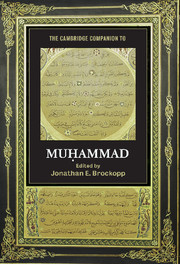Book contents
- Frontmatter
- Introduction
- Part I Muḥammad in his world
- Part II Muḥammad in history
- 4 The Prophet as lawgiver and legal authority
- 5 Personal piety
- 6 Muḥammad as the pole of existence
- 7 The Prophet Muḥammad in ritual
- 8 Muslim philosophers’ rationalist explanation of Muḥammad’s prophecy
- 9 Where earth and heaven meet: remembering Muḥammad as head of state
- Part III Muḥammad in memory
- Index of Quaran Verses
- General Index
6 - Muḥammad as the pole of existence
from Part II - Muḥammad in history
Published online by Cambridge University Press: 28 May 2010
- Frontmatter
- Introduction
- Part I Muḥammad in his world
- Part II Muḥammad in history
- 4 The Prophet as lawgiver and legal authority
- 5 Personal piety
- 6 Muḥammad as the pole of existence
- 7 The Prophet Muḥammad in ritual
- 8 Muslim philosophers’ rationalist explanation of Muḥammad’s prophecy
- 9 Where earth and heaven meet: remembering Muḥammad as head of state
- Part III Muḥammad in memory
- Index of Quaran Verses
- General Index
Summary
The peculiar concerns of modern society tend to furnish the lenses through which figures like Muḥammad are viewed today. That is, modern biographies of the Prophet tend to see him chiefly as a leader responsible for establishing a movement, the significance of which is to be gauged mainly in terms of its social and political impact. His prophetic role is often understood primarily in terms of the establishment of ritual and legal norms that, in principle, governed the habits of an emerging Islamic civilization. The modern European concept of multiple religions carries with it assumptions about a contest between major religions for establishing a dominant position in the world today. Thus, a prophet who is viewed as the founder of one of the world's major religions is inevitably seen, in retrospect, mostly as a key player in this historic struggle. This observation holds both for non-Muslim Euro-Americans alarmed about the very existence of Islam, and for Muslim triumphalists who take refuge in Islam as an anticolonial identity. Modern reformist Muslims tend to downplay suggestions that the Prophet could have had any extraordinary status beyond ordinary human beings, and the Protestant inclinations that characterize much of the contemporary climate of opinion on religion (for Christians and non-Christians alike) reinforce the notion that Islam is a faith that lacks the supernatural baggage to be found, for instance, in Catholic Christianity.
- Type
- Chapter
- Information
- The Cambridge Companion to Muhammad , pp. 123 - 138Publisher: Cambridge University PressPrint publication year: 2010
- 4
- Cited by



